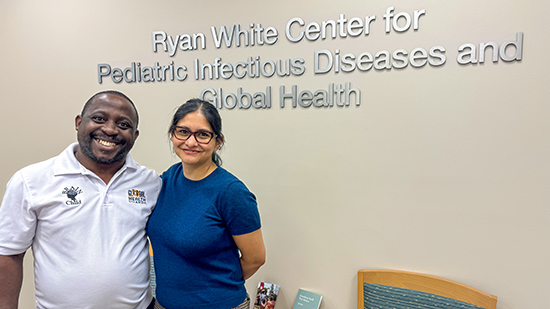Neurosurgeon Alex Muhindo, MBChB, FCS, knows that when it’s mango season in Uganda the number of children seeking care for traumatic brain injuries from falling out of trees will skyrocket. What he doesn’t have is an easy way to know is how many of those brain injuries will result in persistent impairment in cognition, attention and memory.
If he, and other doctors around the world, could accurately predict as quickly as possible which children would experience future neurocognitive impairment, they could more quickly and accurately intervene with appropriate rehabilitation.
Dr. Muhindo was selected as a 2023-24 Fogarty LAUNCH Fellow through the Northern Pacific Global Health Leadership, Education and Development for Early-Career Researchers (NPGH LEADERs) and the purpose of his fellowship research study is to compare point-of-care brain injury biomarkers measured using Abbott’s iSTAT handheld device and to explore whether the Abbott point-of-care test can accurately predict the severity of traumatic brain injury (TBI) in children identified by CT scans. The findings of this study have the potential to alter trauma care in clinical settings in low- and middle-income countries.
Certain brain-specific biomarkers measured in blood, such as GFAP and UCH-L1, can help identify the severity of TBI. “These biomarkers are like biosensors that tell us after a head injury what's going on. Is there bleeding? Is this person going to do well or are they going to need some serious rehabilitation?” explains Dr. Muhindo, a specialist neurosurgeon at Mulago National Referral Hospital, a 1,500-bed hospital and one of only two national referral hospitals in a country of 45 million people. Unfortunately, the lab-based biomarker assessment uses a highly sensitive tool that is currently unavailable in Uganda and may remain out of reach due to the cost and sensitive nature of the instrument.
“Without this information, we scan everyone. That dose of x-ray is a lot for a young brain. So you want to send a child for a CT scan when you know that this scan is going to show you something. Right now, we scan every child who has a history of a fall or a knock on the head. Some of these actually don't need to have a CT,” Dr. Muhindo continued.
Point-of-care (PoC) TBI biomarker tests, including one developed by Abbott to measure GFAP and UCH-L1, have received U.S. F.D.A. clearance for use in adults with mild TBI to rule out the need for CT scans.
The test is yet to be cleared for use in children in the U.S. or elsewhere, pending validation in pediatric populations, and it makes no claims about predicting future impairment in cognition, attention or memory. As with most research, study of the utility of these biomarkers in pediatric TBI is lacking. Abbott’s willingness to collaborate on this pediatric TBI study in Uganda was the basis of Dr. Muhindo’s NPGH research project.
His research project is nested in the Blood-Biomarkers and Risk Factors of Acute Brain Injury associated with Neurodisability in Ugandan Children (BRAIN-Child) study, which is a National Institutes of Health-R21 study. Dibyadyuti Datta, PhD, assistant professor of pediatrics at Indiana University School of Medicine, is the principal investigator of the study and Dr. Muhindo’s primary fellowship mentor. His mentor team also includes Paul Bangirana, PhD, co-PI of the study and faculty at Makerere University; study co-I, Dr. Keisuke Kawata, clinical neuroscientist and associate professor at IU School of Public Health in Bloomington; and NPGH alumni, Dr. Ruth Namazzi, lecturer at the Department of Pediatrics and Child Health of Makerere University College of Health Sciences in Uganda. Dr. Muhindo recently spent a week at IU, meeting with Dr. Datta and the research team.
“This was my first research job and I really can't thank Dibya and her team enough. I thought this should have been given to someone maybe more experienced, but they trusted me. The whole year one of my themes in was to give it the best that I could,” said Dr. Muhindo. “I wanted to become a proper student of clinical research and not to carry any seniority from being a neurosurgeon. So, I made it my objective to learn from everyone--from the researchers, the research team, study coordinator, study medical officers, research leads and mentors.”
For many investigators in low- and middle-income counties, protected time to conduct research is often elusive. Dr. Muhindo found time for research activities while still meeting the demands of being one of only a few neurosurgeons in Uganda and raising his son. He used time while waiting on patients to come to the surgical theater and other small breaks to work on the study.
The data from the study has now all been collected. Although the fellowship year is officially over, Dr. Muhindo intends to see the study through to the end and is also working on a manuscript about the results.
The NPGH LEADERs Program is a 12-month mentored clinical research training sponsored by the National Institutes of Health’s Fogarty International Center in partnership with several NIH Institutes and Offices. Fellows represent academic institutions from the U.S. including Indiana University, as well as 31 partner institutions in nine low and middle-income countries. The Fogarty LAUNCH fellowship includes a week of onsite research training at the National Institutes of Health in Washington, DC, and ongoing virtual research training throughout the fellowship year.
Due to family obligations and visa appointment backlogs, Dr. Muhindo wasn’t able to attend the training before the beginning of his fellowship last summer but did attend this year. “I realized how much I missed last year,” he lamented. The deadline for applications has been moved earlier in part to ensure selected applicants have time to obtain their visas.
Applications for the 2025-26 cohort of Fogarty LAUNCH Fellows closed in September, but applications for the next annual cohort will open in summer 2025.
Interested IU students or post-doctoral trainees in the health professions can contact IU contact principal investigator Dr. Dibyadyuti Datta, IU program manager, Rachel Johnson (johnsore@iu.edu) NPGH Program Coordinator Bridget DeMouy for more information.



